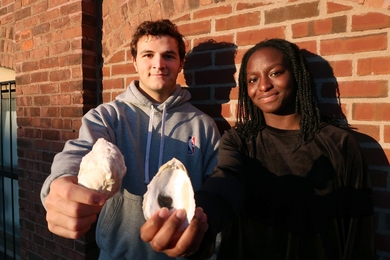Steven J. Tyrell, former associate dean of student affairs and director of student life at Michigan Technological University, has been appointed associate dean in charge of student conflict resolution and discipline at MIT, effective Sept. 1.
Tyrell reports to Robert M. Randolph, senior associate dean for student life, and works closely with Professor Derek Rowell, chair of the Commmittee on Discipline (COD). He will serve as the staff person to the COD and coordinate activity by other disciplinary groups, such as the Dean's Office panels and the judicial committees of the dormitories, fraternities, sororities and independent living groups.
"I am delighted that Steve has come to MIT," said Randolph. "He arrives at a time when we can improve delivery of important services to the whole community. More importantly, he brings the skills we need and the experience to make things happen."
Student disciplinary matters at the Institute are brought first to the chair of the COD, who decides whether the case has merit and, if so, which is the appropriate venue for hearing the complaint. Academic misconduct cases are heard by the COD, which may decide that personal misconduct cases should be heard by another panel.
Tyrell is working with Rowell to clarify disciplinary procedures in two ways: by clarifying the mechanisms for reporting and handling misconduct cases, and by elucidating the Institute's expectations of students.
"I look forward to working with Steve to streamline the procedures leading up to the hearing of charges brought against students," said Rowell. "Through his office, we are trying to expedite hearings and provide counseling of both complainants and respondents."
Rowell said he and Tyrell are working with the Academic Resource Center to hold a session at freshman orientation on the importance of academic honesty, at which time they'll provide examples of plagiarism and cheating. "It's often a gray area for students," said Rowell, a professor of mechanical engineering who has been on the COD since 1996 and has chaired the committee since May 2001.
"It's not always clear to students what the community's standards are," agreed Tyrell. "I want to bring coherence to the way these things are communicated."
"What are we trying to accomplish when we engage in the disciplinary process?" he asked. "Students make bad decisions because they are under stress or in a position where they couldn't focus on what's important. I want to help them figure out what went wrong and explore ways to make better decisions in the future."
He hopes to publish a handbook on student rights and responsibilities that also would outline the disciplinary hearing procedure. "I believe there is a hesitancy to report [inappropriate actions] at MIT," Tyrell said. "Maybe because people don't know what will happen if they report it."
Tyrell received the B.A. in 1983 and the M.A. in educational administration and supervision in 1989 from the State University of New York at New Paltz. He is a Ph.D. candidate in rhetoric and technical communication at Michigan Tech. He has worked in the area of student life for 19 years, at Michigan Tech and SUNY-New Paltz.
A version of this article appeared in MIT Tech Talk on November 20, 2002.






